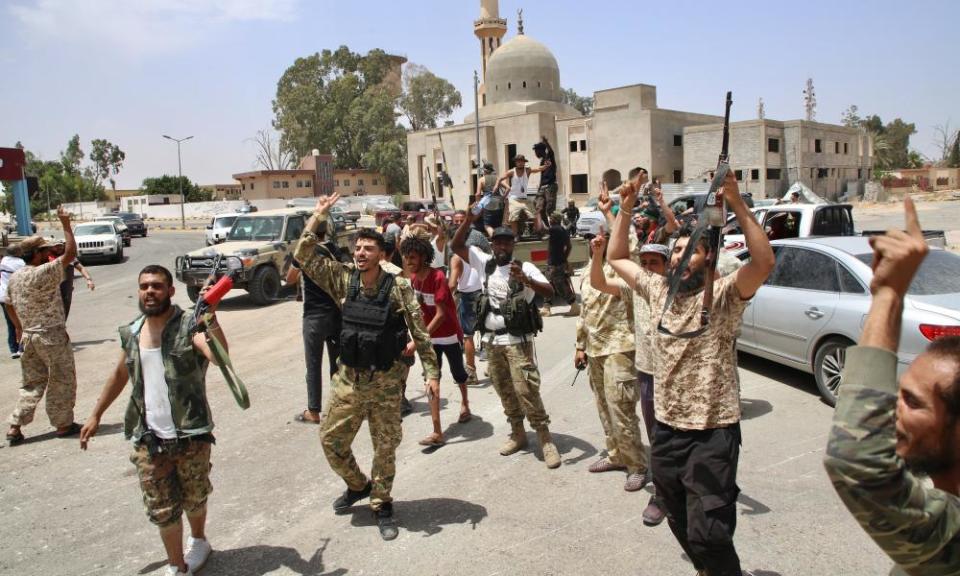UN-backed Libyan forces oust renegade general from Tripoli

A 14 month-siege of Libya’s capital Tripoli by the renegade general Khalifa Haftar ended in failure on Thursday when his forces retreated from the south of the city toward his heartlands in the south and the east of the country.
The interior minister of the UN-recognised government of national accord (GNA), Fathi Bashagha, hailed “the beginning of the end of the entire dictatorship project”, and urged cities under Haftar’s control to rise up against him and spare themselves further conflict.
The extent of Haftar’s retreat may depend on the point at which newly arrived Russian fighter jets intervene to shore up his lines of defence.
Western powers are urging forces loyal to the GNA not to exploit their new military advantage by pushing deep into the east, but instead to allow peace talks to resume to form a new government of national unity.
Related: War in Libya: how did it start, who is involved and what happens next?
In a sign of the new power brokers in Libya, however, the GNA prime minister travelled to Ankara to meet with his backer, the Turkish president, Recep Tayyip Erdoğan. Turkish drones and armaments have turned the military tide against Haftar since March.
Haftar’s forces also retreated from Tarhuna overnight, it was reported, which has acted as a major focal point for supply lines for Haftar’s key al-Jufra airbase in central Libya. At least 14 unmarked Russian jets were flown from Syria to al-Jufra at the end of May.
Initial signs are that GNA forces want at minimum to capture the city of Tarhuna, south of Tripoli. Tarhuna has been the scene of many killings in the past year, and some GNA militia may want to exact revenge on the groups currently running the city.
Hailing the GNA’s restoration of control over Tripoli, Mustafa al-Majei, the spokesman for Operation Burkan Al-Ghadab, or Volcano of Rage, said: “Tripoli has been liberated and fully secured, and we have reached the administrative borders of the city of Tarhuna, south-east of the capital”. The GNA said 25 members of its demining teams had been killed in the south of Tripoli in the past fortnight.
Haftar has been backed by the United Arab Emirates, Egypt and France. The arrival of Russian jets in Libya prompted the US military to warn of a new threat to Nato’s southern flank. It also appears to have awoken previously dormant US diplomacy in the country.
Explaining the recent change in the balance of military power, Wolfram Lacher, a senior associate at the German thinktank Stiftung Wissenschaft und Politik, said: “Turkey only resumed its support after forcing the GNA into an agreement over maritime rights in November 2019.
“Contrary to the covert foreign support for Haftar, Turkish intervention was overt, and it rapidly altered the balance of power after the fighting escalated in late March 2020. Covert UAE support in the form of drones and air defence systems proved ineffective in the face of Turkish military action.”
He said questions now arose about the future stability of both the GNA and Haftar alliances, the ability of Russia and Turkey to come to an agreement about spheres of influence in Libya, and any resumed production in Libya’s oil fields, which are still controlled by Haftar allies.
European policy had proved catastrophic, he said. In future “Europeans will only be able to act in unison if the French position shifts away from its relative tolerance for Russia and adversarial stance towards Turkey. Russia’s military presence in Libya represents a far greater menace to Europe than Turkish intervention.”
In his first overseas visit since the coronavirus outbreak, the French foreign minister, Jean-Yves Le Drian, flew to Rome to discuss the Libyan crisis with his Italian opposite number, . Le Drian has probably been the French politician most supportive of Haftar, seeing him as a potential source of stability against Islamist forces he says run the GNA.
The escalation in fighting in Libya comes against the backdrop of the coronavirus pandemic. Libya has about 170 confirmed cases, but testing remains scarce. There are fears a large outbreak would have a severe impact, given the protracted conflict and the country’s poor healthcare system.
Libya slid into civil war following the removal and killing of the country’s longtime dictator, Muammar Gaddafi, in 2011.

 Yahoo News
Yahoo News 